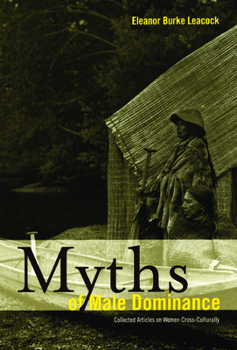Myths of Male Dominance: Collected Articles on Women Cross-Culturally
Select Format
Select Condition 
Book Overview
"Highly recommended, both as a critically presented state-of-the-art discussion and as an account of how one's personal/political history informs the process of scientific inquiry."-- Choice This classic anthropological study debunks the many myths behind the idea of "natural" male superiority. Drawing on extensive historical and cross-cultural research, Eleanor Burke Leacock shows that claims of male superiority are based on carefully constructed...
Format:Paperback
Language:English
ISBN:1931859574
ISBN13:9781931859578
Release Date:April 2008
Publisher:Haymarket Books
Length:360 Pages
Weight:1.00 lbs.
Dimensions:1.0" x 5.3" x 8.0"
Customer Reviews
1 rating
Myths of male dominance and Marxism
Published by Thriftbooks.com User , 15 years ago
"Myths of Male Dominance" is a collection of articles written by anthropologist Eleanor Burke Leacock. The first edition was published in 1981 by Monthly Review Press, a Marxist publisher associated with Paul Sweezy. The present edition is published by Haymarket Books, apparently a front for a certain Trotskyist group. Leacock's ideological perspective is a curious blend of dogmatic Marxism and feminism. Normally, I wouldn't recommend a book heavily loaded with Marxist rhetoric. However, if you can look pass it, "Myths of Male Dominance" does include some interesting material. The main section of the book deals with the Montagnais-Naskapi, an American Indian people in Canada, among which Leacock carried out her fieldwork. This particular people, also known as Innu, is very small but nevertheless played an important role in scientific and political debates during the immediate post-war period. The Montagnais-Naskapi were "primitive" hunter-gatherers, but nevertheless had private property. To many, this disproved the idea (politically associated with Marx and Engels), that humanity had originally lived in a state of primitive communism. Indeed, it was explicitly used as an anti-Marxist argument. During her fieldwork and historical research, Leacock realized two things. First, private property didn't exist among the Montagnais-Naskapi before the arrival of the French colonialists and the establishment of the fur trade. Before that, this people did indeed live in an egalitarian society without real chiefs, where all property was held in common. Second, even after colonization, it was only the right to trap animals for the fur trade which was private. For hunting and gathering in general, all land was still considered a vast commons. Leacock also made a more startling discovery: before colonialism, Montagnais-Naskapi bands had gender equality. Their society wasn't patriarchal. Only with the advent of colonialism and the expansion of the fur trade, did the bands become patriarchal. The private property that accumulated through trapping, trade and plunder made the nuclear family the most important unit of production (rather than the band based on extended families). The nuclear families were headed by men, who in addition controlled the trapping rights. The bands involved in the fur trade were also led by men. Male band leaders used women as virtual slave labour, and often formalized the situation by marrying them! Women were in effect turned into capital. The introduction of patriarchy was eagerly supported by the Jesuit missionaries active in this part of Canada. At the same time, the journals of Jesuit father Le Jeune are an important historical source, since he encountered a communal lifestyle that must have been dominant before colonialism. Le Jeune forthrightly describes the equality among the sexes, the lax attitude towards children, and the ease with which one family adopted the children of another. Also, polygyny and polyandry were rampant.






